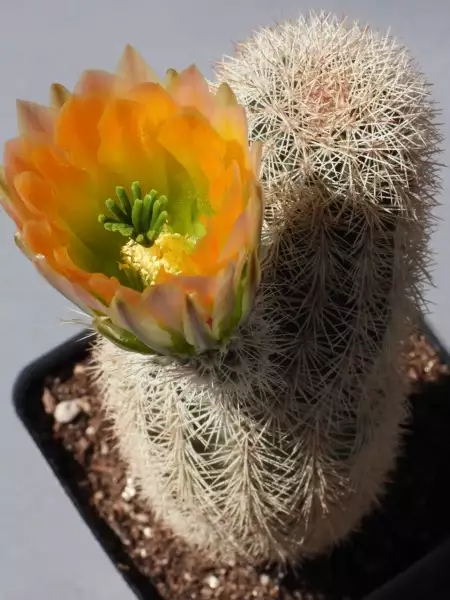
|
Echinocereus X roetteri 5/13/22
My friend Ralph Peters has the opinion that E. X roetteri came from New Mexico populations, and E. lloydii came from Texas populations. I haven't run across any book stating this opinion, but then, not many books have much discussion regarding this hybrid. A problem is that it's not a one-way mating. That is, once A X B happens, in the next generation, [A X B] X A may happen, or [A X B] X B may happen, and therefore, [[A X B]X A] X A may happen next, etc., etc , etc. There is no stable population of a single cross making a single phenotype (= plant with a set physical appearance). Taxonomy is hard enough looking at plants of the same species that tend to be quite similar in appearance. Deciding on how to generate a description of a super variable population is just about impossible. Incidentally, I have tried to generate the F1 hybrid (coccineus and dasycanthus) myself with no luck at all over the many attempts. Maybe I have to do it in Otero County NM or in West Texas to have a chance. I've had lots of luck making further hybrids, that is, pollinating the hybrid, whose seeds came from Mesa Garden in Belen NM, with pollen from any E. coccineus or E. dasyacanthus, or any other tetraploid Echinocereus.
I have to explain "tetraploid." Most cacti have 22 chromosomes, 11 from one parent and 11 from the other parent. But, by the magic of plant biology, sometimes a plant does not do the usual thing at mating to make 22 chromosomes. It makes 44. This is maybe the most important way that plants have of generating new species. A diploid (22 chromosomes; biology jargon: 2n = 22) plant, can't cross, ever, with a tetraploid (44 chromosomes; biology jargon 2n = 44) plant to make viable seeds. It might make what look like seeds, but nothing ever sprouts from sowing these seeds. I'm not aware of any descriptions of this doubling of chromosomes happening in animals. (But, I'm an organic chemist, not a biologist. I'm a hobby biologist. If anyone knows of anything like this among animals, please enlighten me.) And, by the way, it isn't only doubling that can happen in plants, Tripling and higher numbers also occur, no problem. (24/56)